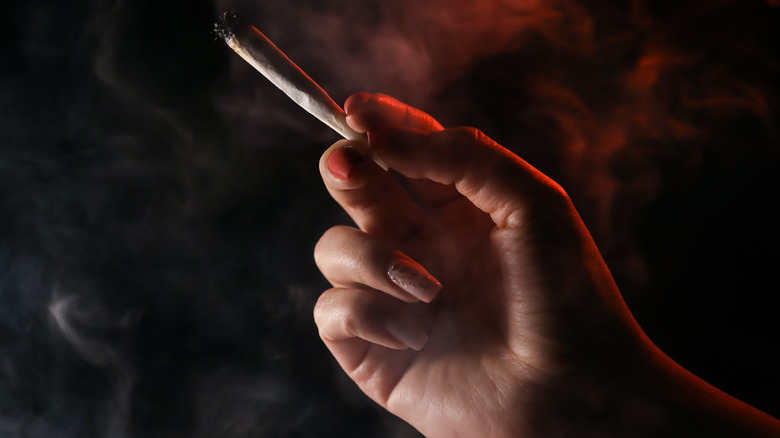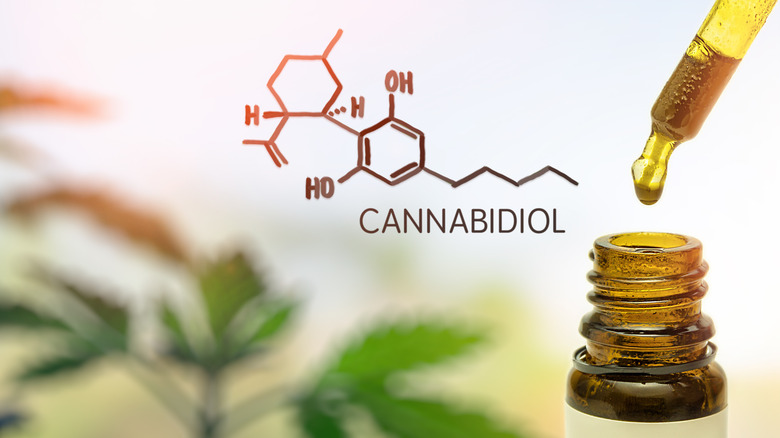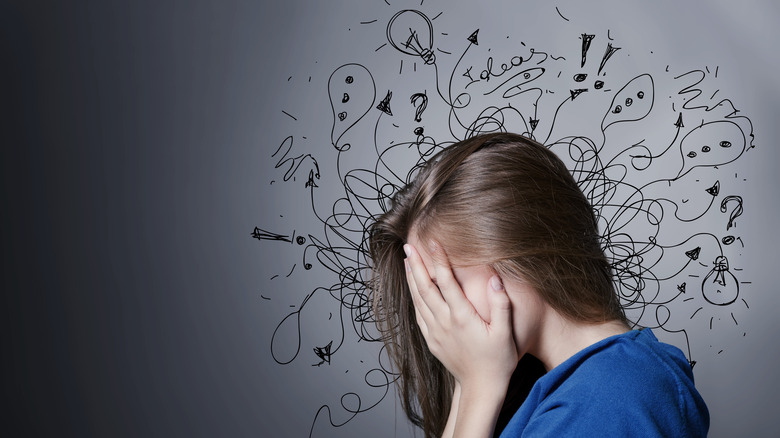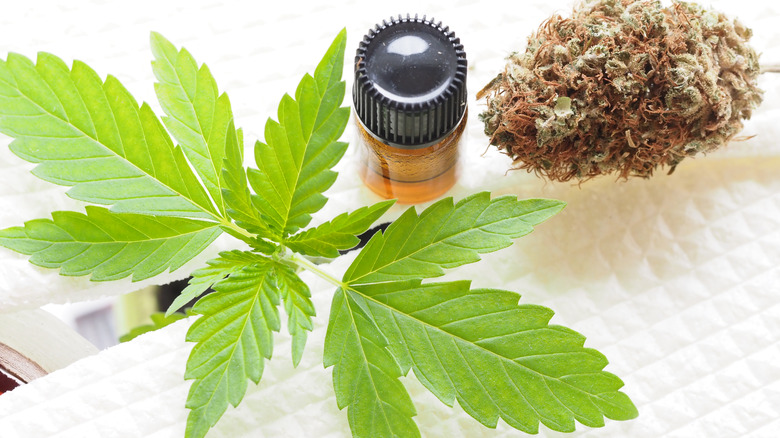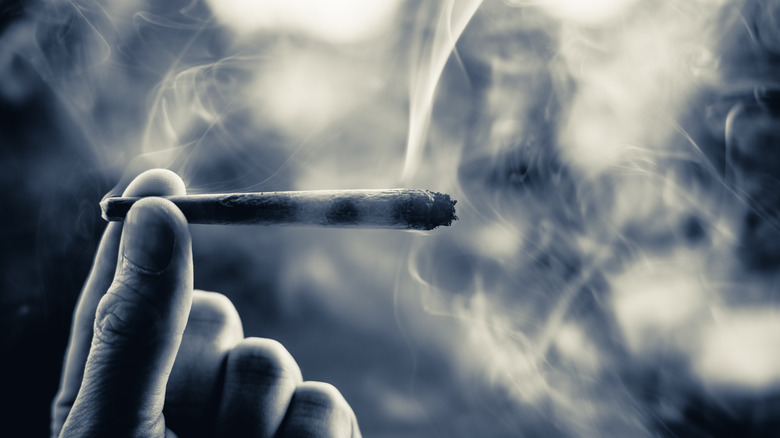When You Smoke Marijuana, This Is What Happens To Your Body
Marijuana, also known as cannabis, weed, pot, and a slew of other names, has been cultivated for millennia (via Science). The plant originally evolved on the eastern Tibetan Plateau, according to a review study of ancient pollen. It's since been used in recreational, medicinal, and spiritual contexts across myriad cultures, most commonly smoked in a pipe or hand-rolled cigarettes, known as a "joints," but also ingested in the form of "edibles" or brewed tea (via National Institute on Drug Abuse).
The decriminalization and legalization of marijuana in recent decades has led to greater social acceptance, enabling a more honest scientific discourse surrounding its effects (via The Washington Post). Unlike most other drugs, cannabis is classified as a depressant, stimulant, and hallucinogen, all in one (via Healthline). Each strain contains its own concentrations of the cannabinoids Tetrahydrocannabinol (THC) — its main psychoactive chemical compound (via Live Science) — and cannabidiol (CBD) — which lacks psychoactive effects but is lauded for its health-boosting properties (via Harvard Health Publishing).
Cannabis-induced symptoms seem predictable: The munchies, the sudden urge to philosophize, a classic wave of paranoia, or the feeling of life's stressors melting away (via Wired). But the effects of smoking marijuana can manifest in diverse ways depending on the person, strain, and environment. The same joint can make one person feel totally "zen" and another teeter on the edge of a panic attack. Here are some changes that occur in your body when you smoke marijuana, including positive and negative side effects.
You may experience euphoria
THC is the cannabinoid molecule that's responsible for the high you experience when you smoke marijuana. The chemical enters your bloodstream via your lungs, quickly making its way to your brain, where it floods your endocannabinoid system, explains a scientific article published in the journal Cerebrum. THC mimics anandamide, a cannabinoid that's naturally secreted by the body, by binding with cannabinoid receptors and activating neurons that send messages throughout the nervous system, according to the National Institute on Drug Abuse (NIDA). The name anandamide comes from the Sanskrit word "ananda," meaning "bliss." It's also alluded to as the "bliss molecule," which is a nod to that happy buzz you get from pleasurable activities like running or eating chocolate (via Labroots).
When THC attaches to the cannabinoid receptors, it influences various bodily systems and causes certain mental and physical reactions like euphoria, per NIDA. THC can affect parts of the brain that are responsible for thinking, concentration, and memory formation, as well as interfering with areas that control coordination, balance, and posture.
THC induces the release of dopamine, the neurotransmitter known as your brain's feel-good chemical, according to a 2021 neuroimaging study from the journal Drug and Alcohol Dependence. There are, of course, other neurotransmitters that factor into the production of feelings of euphoria, including GABA and serotonin — and the flavor of high you experience will vary depending on which ones are being fired up when you smoke (via Psychology Today).
You may find relief from anxiety
Some people turn to weed as an anxiety queller (via Healthline). After a toke, cannabis users may feel relaxed, mellow, and lightheaded — consistent with the "chilled out" stoner stereotype. Based on a 2017 national survey, 81% of Americans associated marijuana with one or more health benefits — 47% of whom said they used it to provide "relief from anxiety, stress, and depression."
The psychoactive compound CBD has been largely credited for the calming effects of marijuana. A 2018 study showed that medical cannabis with high CBD and low THC levels resulted in a 58% reduction in anxiety, and a 2019 study of patients with anxiety and sleep problems found that CBD lowered their anxiety over a one-month period. There's evidence that THC can also reduce stress in low doses (via UIC Today).
Experts don't claim to have any definitive theories about how CBD works (via Healthline). But it's believed that the cannabinoid passes through your lungs into the bloodstream when you smoke, stimulating (rather than binding to) the endocannabinoid system's receptors and causing your body to naturally create its own stress-busting cannabinoids (via Medical News Today). In particular, marijuana enhances the effects of the neurotransmitter GABA, which is known to curb anxiety, suggests research.
At elevated concentrations, CBD activates the 5-HT1A (hydroxytryptamine) serotonin receptor, which underlies weed's antidepressant-like characteristics, according to a 2014 study. CBD may produce similar effects as serotonin, the body's "happy hormone," and a neurotransmitter that regulates mood, sleep, and other bodily functions (via The Scientific World Journal).
Or your anxiety could get worse
For a lot of smokers, marijuana is associated with "spacing out." It can ease your nerves and slow down brain function, per Healthline. But the plant can also elicit the opposite reactions in some people, making their thoughts race and evoking feelings of panic, anxiety, paranoia, and more rarely, psychosis, explains a 2020 review study in the Journal of Translational Medicine.
Marijuana-induced anxiety is often attributed to high levels of THC. The cannabinoid has a "biphasic effect," meaning it can bring relief with small doses and amplify the very thing you want to relieve in higher doses, according to research published in 2018. In other words, too much of a good thing can be problematic. A 2020 study published found that people who regularly smoked cannabis containing a high concentration of THC were more likely to feel anxious, and some (albeit, few) went on to experience psychosis. The study authors note that further research is needed to better dissect how the content and potency of the plant are linked to changes in individuals' mental health.
Additionally, scientists have pinpointed a naturally occurring enzyme called fatty acid amide hydrolase (FAAH) as a potential piece of the anxiety puzzle (via The New York Times). FAAH deactivates anandamide; therefore, people who are genetically predisposed to producing less of the enzyme have higher anandamide levels and tend to feel more relaxed, but they're also more likely to experience cannabis-related panic.
You might feel more creative
Smoking weed has long been hailed as a creative lubricant. Many artists have spoken openly about their use of the plant to get the creative juices flowing. The comedian George Carlin joked that he always kept a joint nearby to help open up "doors of perception" (via Artsy). Research suggests that cannabis can augment creativity by helping users feel less inhibited. Smoking weed is said to engender "psychotomimetic effects," which means that your perception of reality is shaken and your brain is better able to make novel connections and generate unique ideas, allowing you to step outside of your usual patterns of thinking.
Neuroimaging studies have shown that marijuana stimulates cerebral blood flow to the brain's frontal lobe, nucleus accumbens, and amygdala, namely regions of the brain that light up during divergent thinking — a scientific measure of creativity (via Mic). This type of thinking is spontaneous, non-linear, and solution-focused, typically occurring during activities like brainstorming, according to research published in Psychopharmacology. As with most therapeutic uses, the dosage is important, per Mic. The THC in cannabis can make non-creative people more creative when administered in small doses, whereas studies show that high-potency cannabis can actually hinder divergent thinking in regular users.
According to the findings of a 2017 study in the journal Consciousness and Cognition, people who use cannabis score higher on creativity as well as "openness to experience" on personality tests, which poses a causality dilemma: Does smoking pot help stimulate unconventional thinking, or are naturally creative people more inclined to get high?
Your heart rate speeds up
The anxiety that some people experience when they light up can also be chalked up to a sudden surge in heart rate. Within two to three minutes of inhaling marijuana smoke, your heart accelerates by 20 to 50 beats over its normal speed (via Leafly). THC is quickly absorbed into your blood, after which it circulates to your brain, activating the CB1 receptors, hence, most people feel high almost immediately after taking a drag.
According to Leafly, an increase in heart rate is due to vasodilation, whereby blood vessels widen, causing your blood pressure to plummet and your heart to beat faster in order to pump blood around the body. It's thought that the heart works 30% harder to compensate for the impact of THC.
The consensus as to the negative impact of cannabis on your cardiovascular system remains inconclusive. A 2017 study revealed that your risk of a heart attack is 4.8 times higher within the first hour of smoking weed, and a 2016 study showed that smoking cannabis weekly more than quadrupled participants' chances of suffering from a stroke. Other studies highlight a dearth of evidence as to whether or not smoking marijuana can contribute to cardiovascular problems, with some researchers suggesting that it can even have a therapeutic effect on heart health. Once again, the answer might lie in the dose of THC that's ingested (via Leafly).
Your eyes become red and bloodshot
Red, bloodshot eyes is one of the tell-tale signs of marijuana use. This was once believed to stem from irritation caused by cannabis smoke, but scientists now know this to be another side effect of vasodilation, notes McGill University's Office for Science and Society. When THC binds to cannabinoid receptors, it causes your blood vessels and capillaries to dilate, which, in turn, lowers your blood pressure and increases blood flow to the eyes, giving you that red, glassy-eyed look. It can also explain why some pot smokers feel dizzy.
"It's cannabis' ability to reduce intraocular pressure in the eyes that makes it a potentially viable treatment for glaucoma, a group of eye disorders that causes damage to the optic nerves which can eventually lead to blindness," Melanie Bone, a board-certified OB-GYN, told Weedmaps. Though, some studies have challenged the idea that marijuana can treat and relieve symptoms of glaucoma, with a 2018 study suggesting that CBD might even exacerbate the disease by raising eye pressure.
Furthermore, an allergy to cannabis or an adverse reaction to smoke isn't out of the question when it comes to the cause of your bloodshot eyes, warns Leafly.
Your pain may lessen
The effects of smoking marijuana can vary from person to person, strain to strain. The "indica" strain is known to be sedating, which is why many people use it as a relaxant, to alleviate pain, or as a sleep aid (via Medical News Today). The "sativa" strain is thought to yield an energizing experience, while hybrid strains purportedly embody a combination of effects. These generalizations are challenged by some botanists, however, who argue that the chemical composition of each plant needs to be scientifically examined to determine its true effects (via MedicineNet).
Over 50% of young Americans have tried cannabis at some point, based on data published in Nature. And a 2019 study published in the journal Health Affairs points towards pain management as one of the principal reasons people turn to medical marijuana, with certain strains touted as safer alternatives to traditional pain-relief medications like opioids (via Medical News Today).
Weed's main molecule THC modulates pain by directly triggering CB1 and CB2 receptors as well as interacting with other G-protein-coupled receptors (GPCRs), such as the opioid and serotonin (5-HT), details a 2018 review article. CBD is also thought to have significant analgesic effects.
You could experience anti-inflammatory benefits
One of the ways in which marijuana contributes to pain relief is through its anti-inflammatory properties, explains a 2018 study in Frontiers in Pharmacology. THC exerts its anti-inflammatory action by activating the CB1 receptor in the central nervous system, which plays a key role in perception (via ScienceDaily). But most importantly, THC activates the CB2 receptors on immune cells, which reduces the body's pain-inducing reaction to inflamed tissue.
Caryophyllene — a terpene found in cannabis — has also been found to activate CB2 receptors, bringing down inflammation and lessening your feelings of pain. The non-cannabinoid compound is said to be most abundant in certain indica and hybrid strains, and may help treat various chronic and inflammatory illnesses like colitis and Alzheimer's disease, per Leafly.
CBD also tames inflammation by decreasing the production of cytokines, which are chemical messengers in the body that help generate inflammation to fight off infections and viruses, explains a 2020 study in Nature. The authors conclude that CBD may be beneficial in treating chronic pain conditions like rheumatoid arthritis, especially when used in combination with antirheumatic medications, but further research is needed to carefully document CBD's anti-inflammatory effects.
Your senses are heightened
In contrast to the depressive effects that often accompany smoking marijuana like relaxation and pain relief, some users have a heightened sense of sight, smell, and other sensations (via Cleveland Clinic). Colors may appear more vibrant and vivid, sounds become more noticeable or intruding, and you might find that you're suddenly more sensitive to certain smells and textures. Some people even report visual and auditory hallucinations. This might tie in with the uptick in creativity that people claim to experience (via Mic).
According to researchers, the intensification of sensations can be explained by the presence of THC, which binds to receptors that enhance your sensory perceptions, resulting in heightened subjective sensory appreciation and awareness as well as vivid mental imagery. A study published in the journal Nature Neuroscience also linked this to the surge in appetite that many users report when they smoke, colloquially known as "the munchies." Specifically, findings reveal that THC locks into the receptors in the brain's olfactory bulb, increasing your sense of smell and taste, which makes you more inclined to want to eat.
According to research published in Brain Research, the munchies may also be due to THC acting on receptors in the hypothalamus, raising ghrelin — the "hunger hormone" — in your body, thereby driving up your appetite.
You may experience feelings of 'oneness'
Marijuana has been subject to scientific investigation for decades (via Scientific American). Yet, with over 400 ingredients, some of which have opposing effects, the biochemistry of this complex plant is yet to be fully understood, according to a report in Therapeutic Advances in Psychopharmacology.
Smoking weed doesn't typically yield hallucinogenic-like qualities, but some users have reported psychedelic effects, including hallucinations and trip-like experiences, which have mostly occurred after consumption of purified THC as opposed to the entire plant, according to a 2018 case report published in the journal Cannabis and Cannabinoid Research. The authors speculate that the hallucinatory effects of cannabinoids are rooted in the effects of exogenous cannabinoids on 5-HT or NMDA receptors. Smoking certain strains of the plant, in particular those that contain a higher concentration of THC, is known to produce psychedelic-like experiences (via WayofLeaf). But scientists are still trying to figure out how and why this happens.
A 2021 study published in the Journal of Psychopharmacology lends support to the idea that high doses of THC can induce similar states of altered consciousness as psychedelics like LSD or psilocybin. Specifically, some users have reported a sense of "oneness" with the universe, described by psychologists as "oceanic boundlessness," as well as "mystical experiences" that include feeling connected or "at one" with their environment, or a "revelatory sense of awe." Research shows that feelings of oceanic boundlessness can be therapeutic with positive outcomes for mental health, similar to the effects demonstrated in clinical trials of psilocybin and LSD.
You could become dependent on marijuana
While a recreational puff is unlikely to progress to a full-blown dependence for most people, marijuana's potential as an addictive substance shouldn't be downplayed, according to some scientists (via The Washington Post). Around 30% of users develop some degree of marijuana use disorder, as estimated by the National Institute on Drug Abuse, whereby an individual experiences withdrawal symptoms when they stop smoking, reporting symptoms such as cravings, irritability, restlessness, loss of appetite, and mood and sleep problems.
When you inhale cannabis smoke, THC stimulates neurons in the brain's reward pathway, firing up the neurotransmitter dopamine (via Healthline). This contributes to feelings of pleasure — in the same way as when you eat something you love — and the more often you smoke, the more your brain makes the connection between the activity and the sense of satisfaction you get from it, teaching you to repeat the rewarding behavior.
Research published in the journal Proceedings of the National Academy of Sciences shows that extended and heavy use of cannabis can take a toll on your dopamine system, namely the brain's pleasure center. Specifically, the brain develops a decreased response to dopamine, causing people who misuse the drug to find things less pleasurable and rewarding than they once did. A 2016 study published in Molecular Psychiatry found that people who misuse cannabis have "significantly lower" dopamine release in the striatum, which may account for why smoking pot can be addictive for some people.
Your mouth becomes dry
Cotton mouth is a familiar side effect of smoking marijuana, which refers to the dry or parched feeling in your mouth, tongue, and throat (via Mic). This commonly accepted phenomenon, which goes by the scientific name xerostomia, stems from a lack of saliva. This occurs when THC binds to the endocannabinoid receptors in the submandibular glands in the mouth, blocking signals from the parasympathetic nervous system, and temporarily preventing the secretion of saliva, per Mic.
THC zips throughout your body and makes its way through your bloodstream before attaching to the cannabinoid receptors, Lewis Nelson, professor and chief of the division of medical toxicology at Rutgers New Jersey Medical School, told Mic. Therefore, how you consume the plant — whether by smoking or ingesting it as an "edible" — doesn't really make a difference when it comes to suffering from a case of cotton mouth.
While it may feel like the Saharan Desert inside your mouth, smoking weed doesn't necessarily dehydrate you. "It's just that the glands are shut down," explained Nelson. Needless to say, practicing proper hydration is always a good idea, just be sure not to overdo it, he warned.
Your perception of time becomes distorted
Like most mind-altering substances, marijuana warps our perception of reality, for example, slowing down our sense of time — a phenomenon known as "time dilation" (via Mic). So, five minutes may be experienced as ten when you're high. A 2014 study published in the journal Psychopharmacology demonstrated that smoking marijuana sped up users' internal clock, creating the impression that time was passing by more slowly. When subjects were "high," some overestimated time and others underestimated.
Smoking yields a more dramatic sense of time dilation than consuming edibles, since inhaling weed is the quickest way to get THC into the bloodstream, per Mic. The frequency with which you smoke can also make a difference — novice marijuana smokers tend to experience time distortion more often, whereas seasoned smokers generally don't notice it as much.
The precise mechanisms involved in time dilation remain unclear. But it's believed that when THC enters your system, it acts on the endocannabinoid receptors within the thalamo-cortico-striatal circuit — a region of the brain that's in charge of time perception, according to research — which disrupts its normal process and functioning.
Your libido may increase
While the effects of cannabis on libido have yet to be studied extensively, it's common to hear of people lighting up a joint to amp things up in the bedroom. A 2017 population-based study published in the Journal of Sexual Medicine reinforced the link between marijuana and sexual desire, revealing that cannabis users reported having more sex compared to those who abstained from weed.
According to a 2019 cross-sectional study, women also reported increases in sex drive and improved satisfaction with orgasm after smoking weed. The authors postulate that the plant interacts with cannabinoid receptors in the hypothalamic-pituitary-gonadal axis, which regulates sex hormones, including gonadotropin-releasing hormone and oxytocin release. THC also impacts testosterone levels. These interactions improve sexual function in various ways, such as by lowering sexual inhibitions, heightening and prolonging pleasurable sensations, and increasing confidence and the willingness to experiment.
Some men consider marijuana a "natural viagra," citing increased sexual stamina after smoking, according to research, but things may not be as they seem. Oftentimes, what they're really experiencing is a distorted perception of time, which leads them to think that they're lasting a lot longer than they are (via Mic). However, Mitch Earleywine, a professor of psychology at the University at Albany, SUNY, told Self, "Animal research suggests that stimulating the CB1 receptor delays ejaculation, so reports about the time of the act in humans could be true (and not just a result of impaired time perception)."
Or your sex life could take a hit
Not everyone is quick to praise the aphrodisiac-like effects of cannabis. Some users claim that smoking marijuana might be more of a downer than a performance booster, per Mic. A 2019 systematic review found that marijuana can contribute to erectile dysfunction, which was twice as high in cannabis users than non-users. "One of the possible mechanisms is attributed to the endocannabinoid system through the binding of receptors in the paraventricular nucleus of the hypothalamus which regulates erectile function and sexual behavior of males," the authors detailed, adding that the connection between marijuana and erectile dysfunction is likely rooted in a combination of psychological and organic factors.
Research has shown that delayed ejaculation can also put a damper on sexual functioning. Men who smoked weed on a daily basis complained about taking too long to reach orgasm or not at all, while some reported premature ejaculation. What's more, it's long been speculated that cannabis can negatively affect sperm quality.
According to a 2015 study, men who smoked frequently — i.e., more than once a week — had a 29% lower sperm count compared to those who smoked once a week or less. But a 2019 longitudinal study found that men who smoked weed at some point in their lives had a higher sperm count than those who had never smoked. The authors hypothesize that, unlike heavy use, moderate cannabis use may actually improve testicular function and produce reproductive benefits.
Long-term use may impact your memory
The forgetful stoner trope has endured pop culture for decades. And while the occasional drag from a joint is unlikely to cause cognitive damage, there appears to be some evidence that regular cannabis consumption can negatively affect your memory. Smoking cannabis may be even more damaging to the developing brains of teenagers than alcohol, reports a 2019 study, suggesting that the plant alters the brain's neural tissue.
In particular, marijuana has been found to compromise thinking, short-term memory (where recent events are stored), executive function, and psychomotor function, namely movement that requires attention and coordination like driving a car (via Harvard Health Publishing). THC binds with receptors in parts of the brain that play a key role in memory formation, such as the hippocampus, amygdala, and cerebral cortex, resulting in the weakening of connections, or synapses, between neurons (via Nature). By contrast, some studies have shown that the anti-inflammatory and antioxidant properties of CBD within marijuana can help treat various neurodegenerative conditions that affect memory, such as Alzheimer's disease and epilepsy. A 2019 review has even claimed that cannabis might prevent or slow down dementia.
The extent to which smoking marijuana underlies cognitive decline — or helps remedy illnesses that involve memory loss — requires further investigation. While long-term use of cannabis can have deleterious effects on memory, according to a brain-scanning study, the silver lining may be that these impairments are often temporary and even reversible within a few weeks of cessation.
